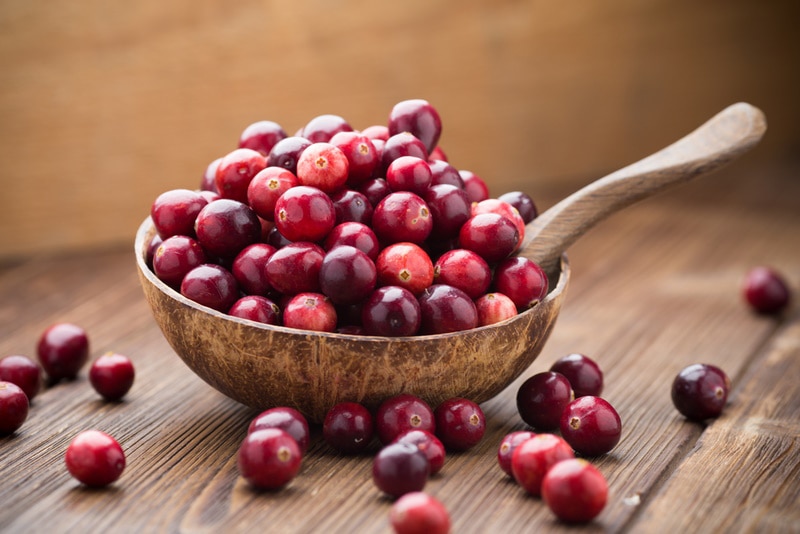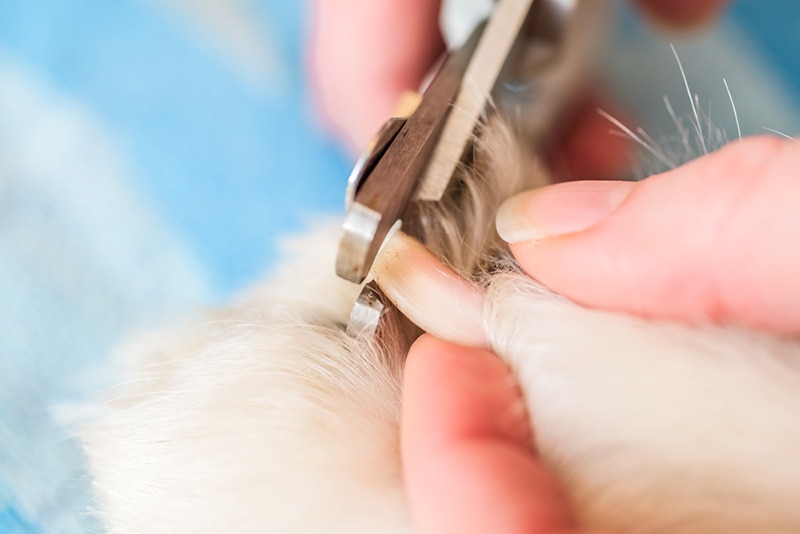Can Dogs Eat Lingonberries? Vet-Approved Facts & FAQ
By Kit Copson
Updated on

Lingonberries (Vaccinium vitis-idaea) are small, bright red berries commonly used in Scandinavian conserves. They also go by the names cowberry, mountain cranberry, and partridgeberry. Lingonberries are a source of various vitamins and minerals, but is it okay for dogs to eat them?
In short, yes, but only in moderation. Read on to find out more.
Are Lingonberries Good for Dogs?
In moderation, lingonberries might do dogs some good. In fact, some dog food brands even include lingonberries in their formulas. We didn’t come across any official studies into the benefits or risks of lingonberries for dogs, but lingonberries are a good source of antioxidants, containing vitamins A, B, C, and E. Antioxidants contribute to immune system health.
In addition, lingonberries are known for being good for the digestive system and for possibly having an anti-inflammatory effect on the body. They are also a source of potassium, magnesium, and calcium. All that said, lingonberries shouldn’t be offered to dogs in large amounts or too often for a number of reasons.
For one thing, too much fruit—even fruits deemed safe for dogs—can cause a stomach upset because fruit is high in sugar. Dogs that overindulge could end up with diarrhea and/or a spell of vomiting. The tannins in lingonberries can also contribute to a stomach upset if dogs eat too many. Furthermore, the arbutin in lingonberry tea and juice might be mildly toxic to dogs.

How to Feed Lingonberries to Dogs
You can offer a few washed lingonberries to your dog now and again as a treat in dried (no sugar) or fresh form. Avoid offering lingonberry jams or other items, as these may contain sugar and other ingredients. Bear in mind that there’s no guarantee your dog will like lingonberries—they’re known for having quite a tart flavor.
Can Dogs Eat Cranberries?
Yes, cranberries (which are, in fact, related to lingonberries) are a source of vitamins C, B1, B2, K, and E, so they’re full of antioxidants. They’re also rich in fiber and contain copper and manganese. They can be eaten either fresh or dried.
However, like other fruits, cranberries should be eaten in moderation to prevent an upset stomach. Avoid cranberries prepared with added sugars or xylitol, which is a common sweetener.

Can Dogs Eat Blueberries?
Yes. Like cranberries and lingonberries, blueberries are sometimes found in dog food formulas thanks to their antioxidant powers. Also high in vitamin C and fiber, they’re fine to eat in small amounts from time to time, but avoid going overboard.
How Much Fruit Can Dogs Eat?
Fruit should be treated as a healthy snack for dogs rather than a staple of their diet. As mentioned above, eating too much fruit is a sugar and fiber overload that may upset your dog’s digestive balance. As a general guideline, extras like fruits, vegetables, and other treats should only account for around 10% of a pooch’s daily calorie intake.
Which Fruits Are Safe for Dogs?
A number of fruits are safe for dogs as long as you don’t overindulge them, and as long as you take out any seeds, stones, and pits and remove rinds, peels, and leaves. These parts of the fruit are often toxic or choking hazards. Any fruit you offer should be cut into bite-sized pieces. Safe fruits include:
- Apples
- Blueberries
- Cranberries
- Lingonberries
- Blackberries
- Raspberries
- Bananas
- Mango
- Peaches
- Watermelon
- Strawberries
- Pineapple
- Pears
- Oranges
- Cantaloupe

Which Fruits Are Unsafe for Dogs?
Any fruit can be unsafe for dogs if they’re allowed to eat the seeds, stones/pits, rinds, or leaves. Nevertheless, some fruits and fruit plants are more risky, including:
- Tomato plants (contains solanine)
- Unripe tomatoes (contains solanine)
- Cherries (the pit contains cyanide)
- Grapes (linked to kidney failure)
- Raisins (linked to kidney failure)
- Avocado (contains persin)
Final Thoughts
To recap, fresh and dried lingonberries are safe for dogs in small portions, and only when they’re fed occasionally. In addition to lingonberries, dogs can safely enjoy a number of berries in moderation, including raspberries, strawberries, blueberries, and blackberries. You might want to sprinkle a few safe berries on your dog’s food now and again for an antioxidant boost.
See also:
- Can Dogs Eat Activia Yogurt? Vet-Reviewed Health Concerns
- Can Dogs Eat Injera? Vet-Reviewed Health Concerns
Featured Image Credit: Irina Green 27, Shutterstock













